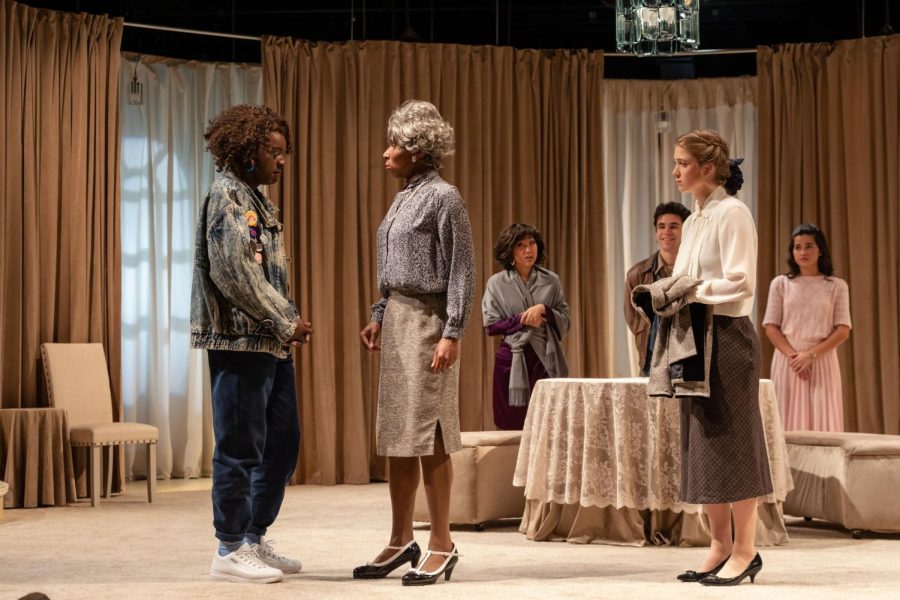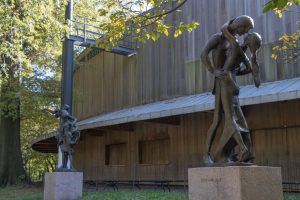‘Tartuffe’: A Gorgeous Exploration of Illusion and Delusion
Fordham Theatre Mainstage presents Molière’s religious drama in a revolutionary light
COURTESY OF JAMES BARTHOLOMEW
Trystan Edwards (right), FCLC ’24, and Raekwon Fuller (left), FCLC ’23, play Madame Pernelle and Dorine, respectively.
November 16, 2022
Fordham Theatre Mainstage first welcomed guests on Nov. 10 to the theatrical performance of a lifetime: “Tartuffe,” freshly set in the 1980s.
The play, which was originally written in 1664, takes audiences on a fresh exploration of family dynamics. Enabled by daring creative choices, the play explores religious deception, sexual deviance, patriarchy and the struggles of trans women of color, all over the course of its two and a half hour run time. The play is an old, rhyme-y masterpiece turned modern and made brilliant by every member of its cast.
“Tartuffe” is about a military family in the ’80s. Their life has been infiltrated by a religious enigma in the form of fraudulent Tartuffe. Having wooed the head of the family, Orgon, with his pious appearance, Tartuffe wreaks havoc on every aspect of their life. He threatens their financial stability, their home and, frequently, their personal autonomy. Perhaps most torturous, Orgon is blind to everything until he is painfully past the point of no return. Tartuffe holds power over him and plays that power so well it’s sickening.
The play’s leading family contains a variety of beautifully developed characters, but outside of the immediate family, their house maid steps to the forefront. The maid Dorine, played by Raekwon Fuller, Fordham College at Lincoln Center (FCLC) ’23, is a force to be reckoned with.
In this adaptation, the maid is portrayed as a Black trans woman, and her experiences throughout the script are given new depth through this creative choice. This adaptation also chooses to center her role to an extent many other productions have not.
“She’s a servant, but she’s the one driving the story,” Fuller said. “So, to explore what it means for a Black trans woman to be taking on the brunt of this play was very interesting, very intriguing.”
“Just watching them work and discover their characters and their point of views…is very active and not flat at all.” Tyler Bey, actor who plays Tartuffe, FCLC ’24
This decision on the part of director Terrence I. Mosley meshed both beautifully and painfully, with the 1980s setting. This era, in all of its beige and Reagan-obsessed glory, was hostile not only to trans women, but also to people of color. The endurance of physical violence, abusive language and misgendering, while loyal to the original script, are used to reach out to a modern audience. Dorine is a testament to the unique struggles of the genderqueer experience, namely in an environment void of basic respect.
“Even if it does not say that Dorine is a trans woman in the script, there are so many elements in the script that contribute to not only the trans experience, but the genderqueer experience,” Fuller said. “Experimenting, doing new things and experiencing the violence perpetuated against that group of people.”
Despite being an emblem of the genderqueer struggle, Dorine is far from a victim. She continually warns the family of the dangers of Tartuffe, encourages a sullen Mariane, played by Natalia Guedes, FCLC ’25, to stand firm against her father’s pressures, and maintains the household despite a jarring lack of respect and gratitude. She is continually correct, and content in being right, even if she goes entirely unappreciated.
“She is not an angry Black woman,” Fuller emphasized. “She is a powerful Black woman who has so much to say and knows what needs to be done.”
Beyond Dorine, the casting and depth in each character is striking from the first to the final moments. Actor Tyler Bey, FCLC ’24, who plays Tartuffe, laughed when asked who else he would play in the show if given the chance. It is apparent that everyone’s pure mastery of their respective role is too impressive a feat to challenge.
According to Bey, at a first glance over the script, some faculty worried that the show’s characters read a little too flat. However, all of this changed as the roles were given over to the actors, and the depth that lay within was brought out in full.
“Just watching them work and discover their characters and their point of views…is very active and not flat at all,” Bey said of their castmates. “It’s not something I would have discovered, but it’s there. It’s there.”
For Bey, his own process in discovering Tartuffe has been equally active, and for him, is still ongoing. Though Tartuffe is the clear antagonist, both Bey and Mosley wanted to avoid a “mustache twirling, charlatan schemer.” They demanded something more complex.
“Terrence and I had this idea of: what if he’s being honest, until he’s not,” Bey explained. “Instead of someone who’s just manipulative throughout.”
They both wanted to portray a human who does a bad thing in the end, but with motives that may have varied throughout this show. Despite the play being packed with digs implying his pure corruption, the vision was actually to combat that exact perception. There is a greater faith in humanity’s goodness communicated by this choice, but also, the dire reality of temptation’s potent sway.
All in all, “Tartuffe” is a show that poses questions to its audience. It challenges viewers to examine the influences in their lives and the forces of corruption they may be blindly ruled by. Viewers leave having learned something not only about themselves but about the often silent struggles of others. It is a force for contemplation, for reflection and ultimately, for change.















David Nicholson • Nov 17, 2022 at 6:11 pm
I’d love to see this production, but living in Toronto, I probably won’t get to. Just one quibble about the review: when mentioning the script, even the “original script” it might have been helpful to note the actual script in English is an adaptation by playwright Ranjit Bolt.